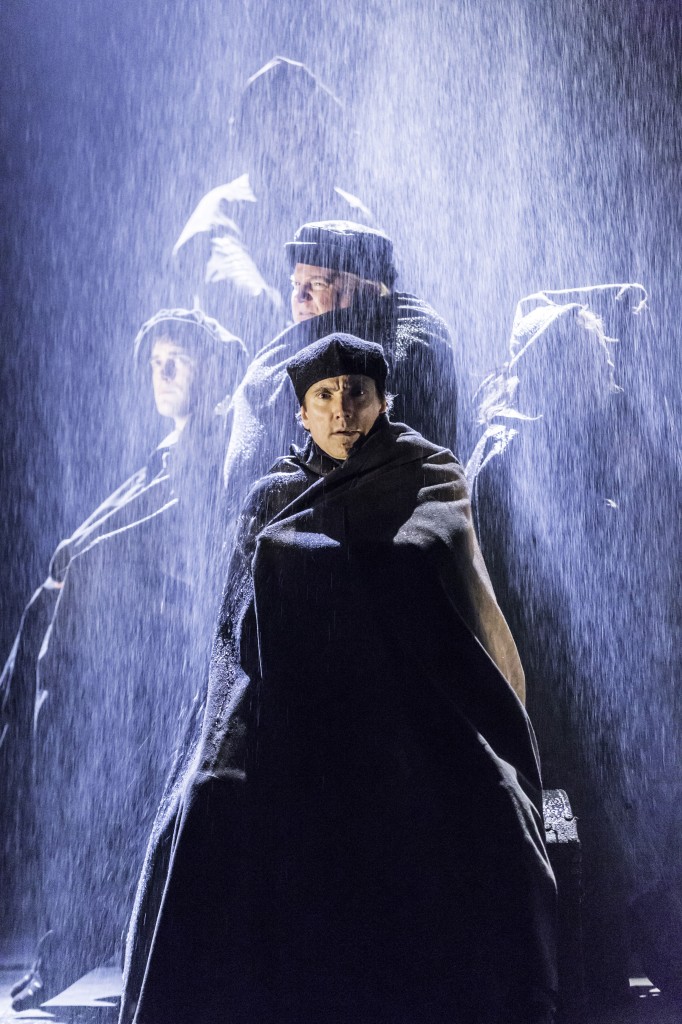King Henry VIII’s divorce from his first queen, Katherine of Aragon, in order to marry Anne Boleyn and produce a male heir for the English throne, has been told in plays, film, and TV from many points of view. Robert Bolt’s A Man for All Seasons cast the event as a matter of conscience for Sir Thomas More, Henry’s chancellor, who resisted the separation and lost his head. Anne of the Thousand Days, The Other Boleyn Girl, and Showtime’s The Tudors emphasized the romantic aspect. In all of these iterations, Thomas Cromwell, More’s successor as Henry’s chief advisor, is seen as a Machiavellian villain coldly engineering Katherine’s downfall and then Anne’s when she also fails to give her king a son.
Hilary Mantel’s wildly successful series of historical novels, Wolf Hall and Bring Up the Bodies, rethought that model and makes Cromwell the center of the story. Instead of just lusting for power, Cromwell is seen as doing what he thinks is best for his sharply divided country. By aiding Henry in defying the domineering Catholic church, Cromwell seeks to strengthen England. You could even make the argument that the break with the rest of Europe in kowtowing to the Pope led to the British Empire.
Now the Royal Shakespeare Company has brought Mike Poulton’s absorbing two-part adaptation of Mantel’s books under the umbrella title of Wolf Hall to Broadway after successful runs at Stratford-on-Avon and in London. A BBC TV version is also being broadcast on PBS, so we’ve got even more Tudormania on our hands. The two parts of the stage version run nearly six hours, but at a marathon bout of theatergoing to see both sections on the same day, I was riveted for every minute. Plot follows counterplot in rapid and fascinating succession. My only quarrel is Poulton’s tendency towards overly broad bawdy humor which pops up a bit too frequently.

Credit: Johann Persson
Poulton’s otherwise precise script and Jeremy Herrin’s lighting-quick direction puts a huge cast of 23 playing over 70 roles through their historical paces like champion thoroughbreds. The main racer is Ben Miles as Cromwell. Almost never leaving the stage for both parts, Miles is never flashy or obvious as Leo McKern was in the 1966 film version of A Man for All Seasons. Miles subtly conveys this lower-class lawyer’s thirst for recognition while never descending to melodrama. His motives are also mixed with a passion for what he regards as the truth and the greater good. He’s also a loving husband and father as well as a loyal friend to his mentor Cardinal Wolsey, whose failure to secure a divorce for Henry leads to his disgrace. Miles blends these elements together for a shaded portrayal of a figure usually painted in black and white.
But this is far from a one-man show. There are multi-dimensional offerings from the entire court. Nathaniel Parker captures King Henry’s egotistic appetites for women, food, and power, but also the monarch’s childish fears. Likewise, Lydia Leonard skillfully displays Anne Boleyn’s arrogance as well as her insecurities. Lucy Briers is memorably defiant as Katherine of Aragon and delightfully malicious as Lady Rochford, Anne’s gossipy sister-in-law. Paul Jesson is an earthy Wolsey and Leah Brotherhead is an outwardly meek, but inwardly resolved, Jane Seymour, Henry’s future wife, and Princess Mary, his daughter by Katherine. Even the smallest courtier and servant roles are fully fleshed out.
With the exquisite lighting of Paule Constable for Part One and David Platter for Part Two, Christopher Oram’s austere set transforms into taverns, palaces, dungeons, and riverboats for this intriguing event which is equal parts historical spectacle and political drama.
April 9—July 5. Winter Garden Theatre, 1634 Broadway. Wed., 2 and 7:30 p.m.; Thu., 7 p.m.; Fri., 8 p.m.; Sat., 2 and 8 p.m.; Sun., 1 and 6:30 p.m. $27-$250. Running time: two hours and 40 mins. for each part. (212) 239-6200 or www.wolfhallbroadway.com.
This review has previously appeared on ArtsinNY.com and Theaterlife.com.
